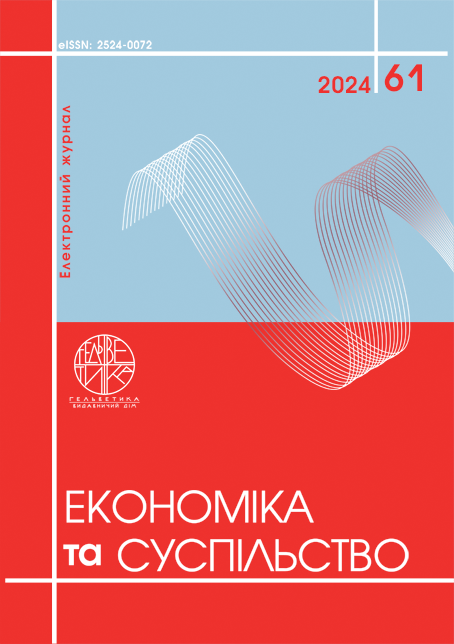CONCEPT AND TYPES OF INTELLECTUAL POTENTIAL OF COMPANIES IN THE IT-SECTOR
Abstract
This article is devoted to defining the concept and types of intellectual potential of companies in the IT sector. It is argued that intellectual potential serves as a starting point for the development of the intellectual capital of IT companies. Through intellectual development, companies expand their capital, improve their innovative capabilities, and remain competitive in the market. The intellectual potential of any IT company is formed by the abilities of intellectual potential carriers and the company itself in creating opportunities for the practical realization of these abilities, their development, transformation into assets, that is, into intellectual capital. It is demonstrated that the intellectual potential of IT companies includes primary components (knowledge and skills; corporate culture and team spirit; relationships and partnerships, research and development) and secondary components (intellectual property; reputation; brand; products, technologies, and solutions). It is argued that based on the responsibility for shaping the intellectual capital of IT companies, it is advisable to divide it into three types: potential, the responsibility for the formation of which lies within the competencies of the management apparatus of the IT company; potential, the responsibility for the formation of which lies within the competencies of the technical personnel of the IT company; potential, the responsibility for the formation of which lies within the competencies of the employees of the IT company who create assets, sell them, and perform analytical functions. The potential of IT companies is created through the multifaceted efforts of engineers, developers, analysts, managers, other staff, and partners. Each of them contributes to the creation of intellectual potential, the development of which becomes quite a complex task through communication and joint efforts. Ensuring a favorable environment for the development of intellectual potential involves investing in training and development of personnel, creating mechanisms for knowledge preservation and transfer, as well as supporting innovative ideas and projects.
References
Bilan Y., Mishchuk H., Roshchyk I., Kmecova I. An Analysis of Intellecutal Potential and its Impact on the Social and Economic Development of European Countries. Journal of Competitiveness. 2020. № 12(1). Р. 22–38. URL: https://doi.org/10.7441/joc.2020.01.02
Бойко Т.Л. Оцінювання ефективності управління інтелектуальним потенціалом з використанням графо-аналітичних методів. Інноваційна економіка. 2014. № 4 (53). С. 367–372. URL: http://ie.at.ua/IE_2014/InnEco_4-53-2014.pdf
Князь С., Віденєєв О. Управління потенціалом інтелектуальної власності підприємства із урахуванням пріоритетів сталого розвитку. Journal of Innovations and Sustainability. 2023. 7(2), 12. DOI: https://doi.org/10.51599/is.2023.07.02.12.
Ostrovska H. Intellectual potential structure in the modern paradigm of enterprise management. Social Economics. 2022. № 63. С 41–55. DOI: https://doi.org/10.26565/2524-2547-2022-63-04
Pinto F., Macadar M.A., Pereira G.V. The potential of eParticipation in enlarging individual capabilities: a conceptual framework. Information Technology for Development. 2023. № 29 (2-3). pp. 276–298. DOI: http://doi.org/10.1080/02681102.2022.2136129
Bilan Y., Mishchuk H., Roshchyk I., Kmecova I. (2020). An Analysis of Intellecutal Potential and its Impact on the Social and Economic Development of European Countries. Journal of Competitiveness. № 12(1). Р. 22–38. DOI: https://doi.org/10.7441/joc.2020.01.02
Boiko T.L. (2014) Otsiniuvannia efektyvnosti upravlinnia intelektualnym potentsialom z vykorystanniam hrafo-analitychnykh metodiv [Evaluation of the intellectual potential management efficiency with using graphical and analytical methods]. Innovatsiina ekonomika - Innovative economy. № 4 (53). pp. 367–372. Available at: http://ie.at.ua/IE_2014/InnEco_4-53-2014.pdf
Kniaz S., Videnieiev O. (2023) Upravlinnia potentsialom intelektualnoi vlasnosti pidpryiemstva iz urakhuvanniam priorytetiv staloho rozvytku [Managing intellectual property potential of enterprises with regard to sustainable development priorities]. Journal of Innovations and Sustainability, 7(2), 12. DOI: https://doi.org/10.51599/is.2023.07.02.12 .
Ostrovska H. (2022) Intellectual potential structure in the modern paradigm of enterprise management. Social Economics. № 63. pp. 41–55. DOI:https://doi.org/10.26565/2524-2547-2022-63-04
Pinto F., Macadar M.A., Pereira G.V. (2023) The potential of eParticipation in enlarging individual capabilities: a conceptual framework. Information Technology for Development. 2023. № 29 (2-3). pp. 276–298. DOI: http://doi.org/10.1080/02681102.2022.2136129


